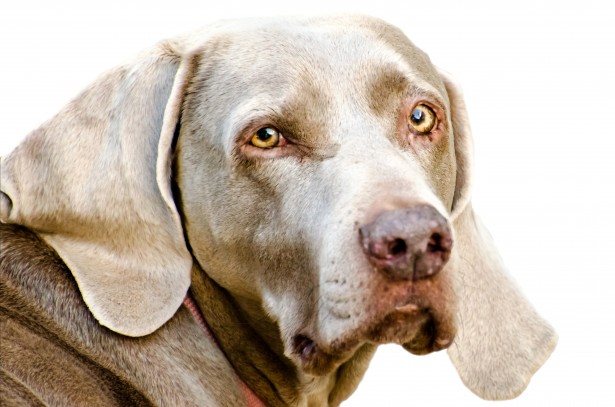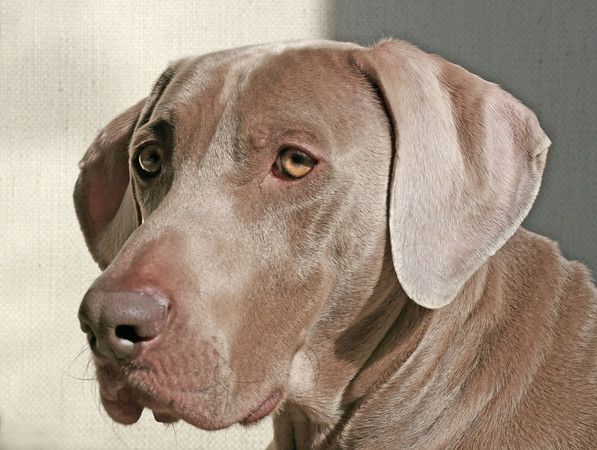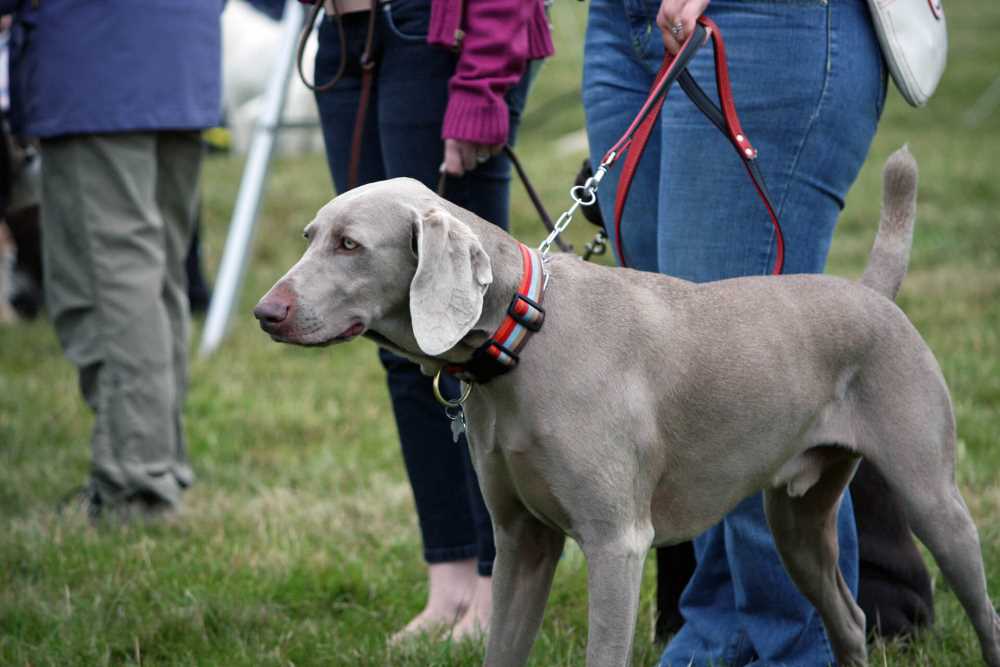Geriatric dogs have different needs than younger dogs. Aging dogs have dog health problems, joint conditions and diseases unknown to puppies and young adults.
As your Weimaraner gets older, he may develop physical and mental limitations, just like an older person.
This is a bitter sweet time in your dog’s life. You start to see the physical and mental signs of aging. Signs of aging remind us that the end is near for our dogs.

Fortunately, your dog doesn’t know this. She simply accepts everything that life brings her and moves on.
She doesn’t feel sadness at growing old and nearing the end of life, because she doesn’t have a clue about what is happening.
So it is important that you keep a positive and upbeat attitude. Dogs do pick up on your emotions.
Make a point of including your dog in family outings and walks as long as she is able to go. And remember to show your old dog affection and love. We all respond to that.
Topics on Dog Aging
As you page down, you’ll see different sections. Each section has summaries of articles talking about that subject. To read an article, just click on the link that follows the summary.
- Section #1 – Signals that Your Dog is Aging
- Section #2 – Sensory Losses in Your Weimaraner
- Section #3 – Sore Muscles and Stiff Joints
- Section #4 – Mental and Emotional Changes
- Section #5 – Physical Changes
- Section #6 – A Little Extra TLC
If you would like to learn more about specific subjects, click on the links and pictures that follow each section. If you have an aging Weimaraner, you might want to check back often, as I’ll be adding more articles about geriatric dogs.
Section #1 – Signals that Your Dog is Aging
How Old is Your Dog in Human Years?
 When young, your Weimaraner dog aged very quickly through her baby and teenage years. And she grew fast, almost too fast! It was hard to keep up with her.
When young, your Weimaraner dog aged very quickly through her baby and teenage years. And she grew fast, almost too fast! It was hard to keep up with her.
Then, when she was about 2 years old, things slowed down as she entered her adult years. Your dog became more settled and less puppy-like.
Aging speeds up again when a Weimaraner enters the final third of her life, around 7-8 years old. A Weimaraner’s life expectancy is about 12 years, but a 7 year old Weim is considered to be a senior dog.
How old is your dog? Calculate your dog’s age in human years here.
Section #2 – Sensory Losses in your Weimaraner
Could Your Dog be Going Blind?

Sometimes it’s hard to tell if your dog is losing his sight. Of course you know that some dogs are born blind and others have accidents that make them blind.
But there are other reasons for dogs losing their sight. And, in many cases, this happens gradually, so you don’t really notice, nor does your dog.
Dogs, like people, get cataracts, retinal detachment and glaucoma. And, of course, there are diseases like diabetes that cause blindness.
So how can you tell?
Continue reading about symptoms of blindness in senior dogs.
Blind Dog Care
 When a dog goes blind he will do the best he can. While that helps, there are many things that you can do to help your blind dog adjust to his situation.
When a dog goes blind he will do the best he can. While that helps, there are many things that you can do to help your blind dog adjust to his situation.
As an occupational therapist, I worked with blind people and helped them learn how to compensate and do their daily activities.
Dogs are similar to blind people in a number of ways. And there are quite a few ways that you can help your blind dog. I’ve included quite a few suggestions in this article.
This article talks about how to help a blind dog.
Products for Blind Dogs
 There are some wonderful products on the market to help blind dogs. Some will help your dog navigate around your home.
There are some wonderful products on the market to help blind dogs. Some will help your dog navigate around your home.
Other products tell people that your dog is blind. That is helpful, as you certainly don’t want someone to rush up to your dog and startle him.
Because your dog has such a wonderful sense of smell, we can use this sense to help our dogs, as well. For example, you can use essential oils as a way to signal to your dog that he’s close to a stairway.
Go to the article about products for blind dogs.
Cataracts in Senior Dogs

Did you know that dogs get cataracts in their eyes as they get older? Cataracts in dogs are common, just like they are in older people. Because dogs use their keen senses of smell and hearing to compensate, we often don’t notice that our dogs are losing their sight.
Weimaraners, just like other dog breeds, can lose their vision because of cataracts.
If you hunt with your Weimaraner you may think that you would know that your dog is not seeing the game as well as she used to.
But because cataracts usually develop slowly, the changes in your Weimaraner dog’s vision will not be obvious to you, or to your dog.
Continue reading about Cataracts in Senior Dogs
Senior Dog Hearing Loss
Senior dog hearing loss is a Weimaraner old age problem that is also sometimes hard to detect. Unfortunately many owners initially think that their dog is just ignoring them and not responding to commands.
It makes sense. As your dog gets older, we think she’s just getting obstinate. That she’s decided she’s an old lady now and just doesn’t have to listen to you. This is actually the most common way we have of knowing that our dogs are losing their hearing.
Well, that may not be true. Senior dogs often lose their hearing gradually, so it can be tricky to figure out that your dog is going deaf.
Continue reading about Senior Dog Hearing Loss
Section #3 – Sore Muscles and Stiff Joints
Dog Hip Dysplasia
Hip dysplasia in dogs, also referred to as CHD, is a degenerative joint disease that is caused by both genetic and environmental factors.
Dog hip dysplasia is one of the genetic diseases that are common in the Weimaraner. Canine hip dysplasia is most common in large dog breeds, and it is associated with canine arthritis.
In some cases, dog hip dysplasia is preventable, if you know what to do to help your dog.
This article, without getting too technical, discusses canine hip dysplasia symptoms, prevention, and treatment.
Continue reading about Dog Hip Dysplasia.
Osteoarthritis in Dogs
 Many dogs, both large and small, get osteoarthritis. Usually symptoms start to develop when a dog is middle aged or older.
Many dogs, both large and small, get osteoarthritis. Usually symptoms start to develop when a dog is middle aged or older.
Arthritis symptoms in dogs like Weimaraners, often mimic symptoms of other diseases. And to make it more confusing, arthritis in dogs is caused by more than one medical condition.
Keep in mind that, just like many other diseases, if arthritis is diagnosed early, you can help your dog be more comfortable and pain-free for a longer time.
Visiting your vet more often as your Weimaraner dog ages, will help you stay on top of any senior dog issues that may arise.
Continue reading about Osteoarthritis in Dogs
How to Tell if your Dog has Arthritis
 Senior dogs lose muscle mass, partly due to being more sedentary and partly because of the normal aging process. Bones become thinner and break more easily.
Senior dogs lose muscle mass, partly due to being more sedentary and partly because of the normal aging process. Bones become thinner and break more easily.
Your dog will probably move slower and she may have trouble getting up and down. In addition, she may need your help to climb onto the sofa or get into your car.
She may develop arthritis or hip dysplasia, making it harder for her to move around. When your dog reaches 7 or 8 years old, you should be alert to any changes that could be symptoms of arthritis.
Because you spend so much time with your dog, you will be the first to notice any changes in his movement and energy levels.
Read about the signs of arthritis that you may see in your dog.
How to Help your Dog with Arthritis
 While there is no actual cure for arthritis, there are quite a few things we can do to help our dogs be comfortable.
While there is no actual cure for arthritis, there are quite a few things we can do to help our dogs be comfortable.
Simple gestures like helping your dog stay warm or providing a comfortable bed that supports your dog, will go a long way toward helping him keep his joints moving.
There are also some wonderful products that will help relieve pain and stiffness.
Read about ways to help your dog with arthritis here.
Section #4 – Mental and Emotional Changes
Dementia in Old Dogs
Dog dementia is probably the trickiest condition for you to diagnose. That’s because the symptoms mimic so many other conditions, like deafness, vision loss or even arthritis. And often we misinterpret our dog’s slow response as defiance or bad behavior.
If your dog has dementia, she is confused and disoriented. And dogs actually can become forgetful. Aging dogs sometimes forget their training, just as older people can become forgetful and forget their manners.
Your faithful Weimaraner may have forgotten all those obedience lessons and commands that you worked so hard on! And she may even have forgotten how to hunt!
Sadly a dog with dementia can even forget her own name and who her people family members are.
Patience is required here. Remember that your Weimaraner is probably not disobeying or ignoring you on purpose.
In addition, up to 40% senior dogs develop older dog separation anxiety. Sometimes this is due to confusion or memory loss.
Continue reading about Dementia in Old Dogs
Separation Anxiety in Senior Dogs
 Separation anxiety in older dogs is not the same as the separation anxiety we see in younger dogs. While they may look similar, the reasons for separation anxiety in senior dogs are quite different.
Separation anxiety in older dogs is not the same as the separation anxiety we see in younger dogs. While they may look similar, the reasons for separation anxiety in senior dogs are quite different.
Even if you have a well-adjusted dog that has been perfectly comfortable with your schedule of leaving routinely, he may become apprehensive when he sees you getting ready to depart!
How common is this? In fact, a full 40% of senior dogs will start to exhibit separation anxiety as they enter their golden years.
So why the difference? What suddenly made your dog dread your leaving, even if only for a short while?
Continue reading about Separation Anxiety in Senior Dogs
Section #5 – Physical Changes in Your Weimaraner
My Dog is Peeing on the Floor!
 Perhaps even more frustrating, aging dogs commonly lose control of their urine, leaving telltale little puddles around the house. This is especially true for spayed females, but neutered males can lose control, as well.
Perhaps even more frustrating, aging dogs commonly lose control of their urine, leaving telltale little puddles around the house. This is especially true for spayed females, but neutered males can lose control, as well.
Dog incontinence is probably one of the most difficult issues for pet owners. If you don’t get things under control quickly, your home and furnishings can be ruined by the smell and stains of urine.
Even though this is quite upsetting, don’t punish your dog. She is not wetting on your floors and carpets or in her bed, on purpose.
For many dogs, especially when there is a urinary tract infection, there is a solution. For others, there are some great products on the market that can help keep things under control.
Continue reading about Senior Dog Incontinence.
Products to Help with Dog Incontinence
 The Weimaraner dog breed is more prone to some dog urinary issues than other dogs. While your dog may become incontinent at age, it is more common with older Weimaraner dogs.
The Weimaraner dog breed is more prone to some dog urinary issues than other dogs. While your dog may become incontinent at age, it is more common with older Weimaraner dogs.
Of course there are some healthy issues that cause a dog to become incontinent, and before you panic, you should explore these issues. Often the problem can be controlled, if you know what’s causing it.
Fortunately it could be simply a dog urinary tract infection. Or your older Weimaraner could have loss of his bladder control.
However, no matter what the cause, you’ll need to address this issue. And, luckily, there are products to help you do this.
Continue reading about Dog Incontinence Products
Metabolism
There is a gradual decline in the rate of metabolism in your dog’s body. Slower metabolism can lead to sluggishness, more time asleep, intolerance to changes in temperature (hot or cold) and tiring easily. In addition, your senior Weimaraner may start to gain weight, even if she has always been fit and trim.
Immune System
Your dog’s becomes weaker with age. Your dog can now pick up bacterial or viral illnesses easily. And, as dogs age, they also develop conditions like diabetes, pancreatitis and Cushing’s.
Food Requirements
Your dog will need fewer calories and may need less food. Consider changing to a dog food diet with lower fat content, for seniors.
Weight Gain
If your dog is not eating an age appropriate diet, he may gain weight. He will slow down and not be as active as he gets older.
Lower activity levels contribute to weight gain. A diet designed just for a seniors will help your dog stay healthy and active.
Temperature Control
Your dog’s skin will become less elastic, and blood vessels lose their ability to react to changing temperatures. Depending on the weather or air temperature and humidity, your old dog may need a sweater or a place to get into the shade.
Skin and Hair
Your dog’s hair will get thinner and his skin will be more susceptible to infections. Skin can be either dry and flaky or very oily and greasy.
Teeth and Gums
Periodontal disease is common in older dogs and sometimes dogs lose teeth because of cavities and diseased gums. Brushing your dog’s teeth can help prevent this problem.
Section #6 – A Little Extra TLC is in Order
Senior Dog Food Needs
Aging dogs need a little more attention than they did as young dogs. Your dog’s intestines are not as efficient at absorbing nutrients. And his kidneys and liver are not working as well at filtering out toxins and waste.
Your dog may now need a special dog food for seniors. But, make no mistake about this, she will still enjoy getting treats! However, if she is having a tough time eating hard treats, consider getting her some soft ones.
Grooming for Senior Dogs
Old dogs don’t groom themselves like they did in their younger years. Because your old dog is pretty tender in places, you’ll need to be more gentle when you groom him. Use a soft brush and remember that his skin is now thinner and it can be easily broken.
Continue to brush your senior dog’s teeth, even though he may have lost some. Pay particular attention to his gums, as a simple gum infection can get into his bloodstream and make him really sick!
Your geriatric dog’s eyes may become a cloudy blue-gray. To prevent infection, gently wipe away any mucus with a damp cotton ball. Also make sure that you wipe the skin around his eyes to keep it clean.
Check your dog’s ears frequently and clean them to prevent wax build-up. Too much wax will encourage ear infections, the leading cause of odor in dogs (both young and old).
Keeping Geriatric Dogs Young and Active
We all want to keep our geriatric dogs as youthful and active as possible. The symptoms of aging take us closer to the end, when we will have to say goodbye. We want to keep our senior dogs with us, as long as possible.
Older dogs still need affection, play and exercise. While you may need to slow down for your older Weimaraner, make sure you still include him in fun activities.
Going for walks will help to keep your dog healthy. You will have to walk slower so that he can keep up with you. But the activity will help him move better, keeping his internal organs healthier. And taking walks is also mentally stimulating for your dog.
As time goes on, you’ll probably have to provide a few things to keep your dog comfortable. And you may have to make adaptations to your schedule and your home!
But, in the end, that’s a small sacrifice to pay for keeping your dog happy and with you longer.









Leave a Reply